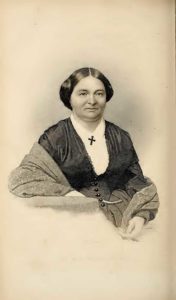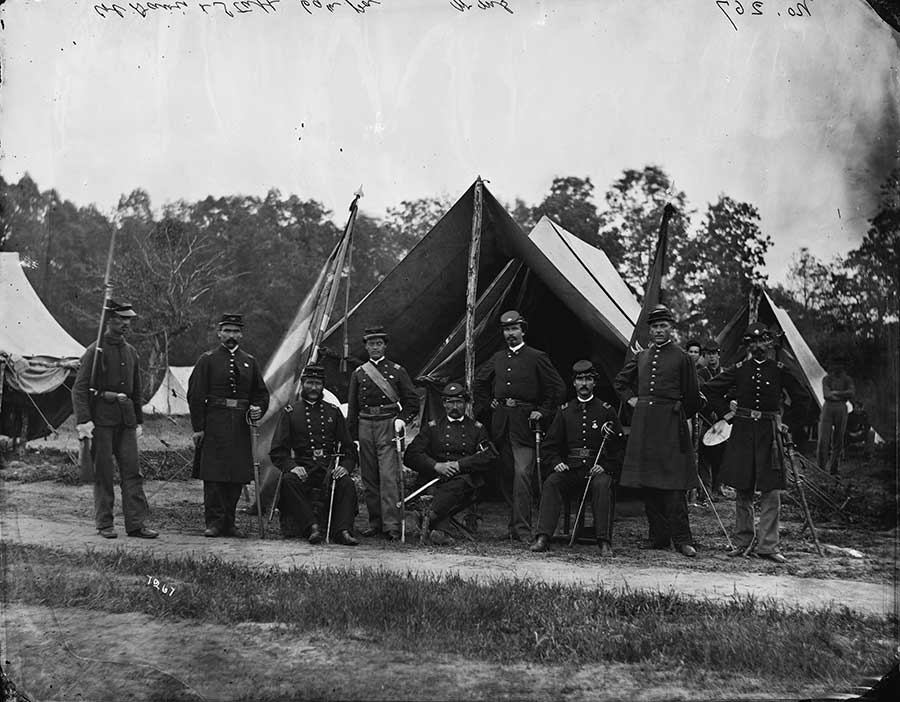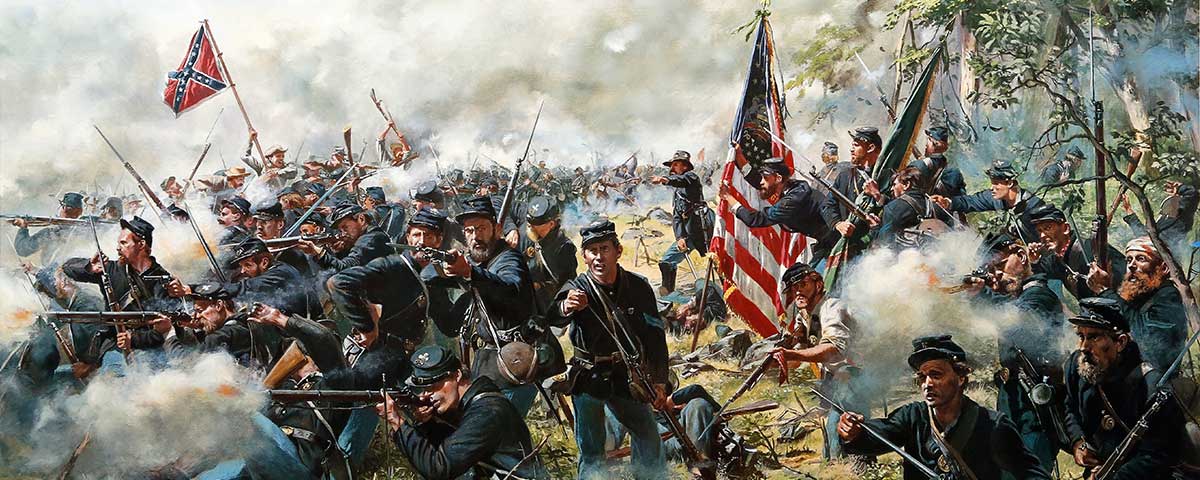Letters reveal pain of those left behind
[dropcap]I[/dropcap]n the weeks following the July 1863 Battle of Gettysburg, tens of thousands of families waited anxiously for word of the fate of their loved ones and friends serving in the contending armies. Had they been killed in the fighting? Had they survived only to suffer from agonizing wounds in crude, makeshift hospitals? The vivid contemporary evidence, found in the pension files for two Pennsyl-vania soldiers who fell at Gettysburg, sheds light on two different families’ ordeals in the aftermath of the Civil War’s largest battle.
In July 1862, the U.S. Congress passed the Pension Act, which provided a monthly stipend to former soldiers who had suffered service-related disabilities. In addition, if a soldier was killed in action, died of wounds, or had succumbed to a disease determined to have been incurred as a result of his military service, a monthly sum would be paid to the descendant’s widow and minor children, or orphan, as applicable. If the deceased had no spouse or children, the survivor’s pension would be issued to another family member, such as parents or siblings.
The National Archives and Records Administration in Washington, D.C., holds thousands of these pension files. The documents there provide a brief glimpse into the lives of the men who fought for the Union and their families. Many files include poignant letters of condolence sent to a soldier’s next of kin, give details of a loved one’s passing, and sometimes even his place of burial. Following are two such letters, found in the mother’s/widow’s pension files, concerning two men who served in the 68th and 69th Pennsylvania Infantries, and fell fighting at Gettysburg. These letters are presented unedited with the original documents’ grammar and spelling.
Private Peter Hilt
68th Pennsylvania, 1st Brigade,
1st Division, 3rd Corps
Before enlisting as a private in Company G of the 68th Pennsylvania in August 1862, 23-year-old Peter Hilt (or “Hill,” according to some records) worked as a moulder in Albany, N.Y., where he lived with his widowed mother, Sibylla, age 55. Unmarried, and the only one of Sibylla’s five children still residing at home, Peter contributed his $10 weekly earnings to the household, which his mother used for rent and necessities. While serving in the Union Army, Hilt sent most of his pay home to Sibylla, who, despite her age and physical infirmities, supplemented her son’s contributions by cleaning several neighbors’ homes.
Late on the afternoon of July 2, 1863, the 68th—part of Maj. Gen. Daniel Sickles’ 3rd Corps, recognizable by the diamond patches (left) soldiers wore on their uniforms—was posted just south of Gettysburg in the Peach Orchard, where they would face the onslaught of Brig. Gen. William Barksdale’s Mississippi Brigade. During the fierce fighting, one of Hilt’s thighs was shattered by a gunshot wound. Several comrades carried the suffering private to the nearby Jacob Schwartz Farm and left him in a barn before returning to duty.
Several days later, volunteer nurse Mary Morris Husband discovered Hilt in the barn and, as she later wrote to his mother, took an “interest” in him. The 42-year-old Husband—a Philadelphia native and granddaughter of Declaration of Independence signer Robert Morris—had worked as a volunteer nurse for the Army of the Potomac at Harrison’s Landing, Va., in the summer of 1862, following the Peninsula Campaign—and after the subsequent battles of Antietam, Fredericksburg, and Chancellorsville. On July 3, upon hearing of the fighting at Gettysburg, Husband again left her Philadelphia home to tend to the needs of “her boys.” She arrived on the field the following day and began working at the Schwartz Farm, which served as the hospital for the 1st Division of the 3rd Corps.
On July 17, Peter Hilt died of his wounds. One month later, Husband, by now back in Philadelphia and herself suffering from a fever that she had contracted in the fetid atmosphere of the Schwartz Farm, sent the following letter to Sibylla.
Phila. Aug. 18th [1863]
Mrs. Hill [sic];
My dear friend
I call you so because I was attached to your son. I have nothing of his but some hair, he probably lost everything on the battlefield. I took charge of some 300 wounded, principally Rebels, in a barn out houses, etc. and the under part of the barn. I spoke to your boy thinking him a confederate but one of the rebels said “do try & get that fellow out of this place, he is very badly wounded & one of your men,” so I at once went & got some boys to help me & carefully moved him to the piazza of a house nearby. He told me about you & said he “was anxious to get well on your account,” so I became much interested in him & urged the surgeons to examine the wound, but they pronounced it hopeless.

I was not satisfied however, and the following day, Dr. Hays, Surg. In Charge of 1st Div. Hosp. came over & I got him to examine he said there was a hope, if he could get him over to the Hosp. to operate on him. I got my boys to carry him on a stretcher, & Dr. H. operated himself, laying open the leg & removing the crushed pieces of bone (the leg was fractured too high up for amputation.) I went to see him the next day & he was doing nicely, everything favorable, & was very grateful to me for accomplishing what I did, as well as getting him in more comfortable quarters. I promised to come & see him as often as possible, but was half a mile from him with a creek between that rose rapidly & cut me off whenever it rained, so I did not see him but once afterward, still doing well, but the weather became warmer & mortification set in, he died very easily, I heard for I knew nothing of it, until all was over, when one of the boys came to tell me & I sent for some of his hair not even having time to go & see him. You have no idea how hard we have to work, after a battle. There are so many who need help & so few to give it, that those who go as I do [volunteer nurse] have scarce time to attend to individual cases or to remember them-but your son particularly interested me & therefore I saved his hair for you & knowing a Mothers feelings knew that you would like to have as much of an account as I can give you it is not much but shews he did not die without an effort to save him, as alas! many of our brave boys do.
He had comfortable food & good nursing during his last days & you may yet obtain more particulars about him, as there were some of his own Regt. in the same ward.
God bless & comfort you
Yours truly
Mary M. Husband
On September 22, 1863, Sibylla Hilt filed for a pension with the federal government, using as part of her evidence the above letter from Mary Husband. In March 1864, her pension request was granted and she began receiving $8 a month, the maximum amount then allowed under the law. Today, the remains of Peter Hilt, the sole support of his widowed mother, lie in Grave B-48 of the Pennsylvania section of the Gettysburg National Cemetery. Sibylla died in early 1894; by that time, her monthly government stipend had increased to $12.
Husband managed to recover from her illness and returned to nursing with the army in the winter of 1863, serving in assorted military hospitals for the rest of the war. She died in Philadelphia on March 3, 1894.
Serving With Honor
Charles McAnally, who was born May 12, 1836, in Ireland and came to the United States in 1852, served with the 69th Pennsylvania Infantry until the end of the war, eventually rising to the rank of captain.
He incurred cuts and gunshot wounds to his left shoulder, head, and face at the May 1864 Battle of Spotsylvania Court House, Va., early in Lt. Gen. Ulysses S. Grant’s Overland Campaign. McAnally suffered additional wounds to his leg at the horrific Battle of Cold Harbor less than a month later. McAnally’s Medal of Honor citation for the Spotsylvania fighting reads: “In a hand-to-hand encounter with the enemy captured a flag, was wounded in the act, but continued on duty until he received a second wound.”
On July 28, 1897, McAnally received notification that President William McKinley had approved him for the Medal of Honor. Charles McAnally, aged 69, died on August 8, 1905. –J.S.

Sergeant James Hand
69th Pennsylvania
2nd Brigade (“Philadelphia Brigade”)
2nd Division, 2nd Corps
In July 1860, a federal census taker visited a dwelling at 1319 N. 16th St. in Philadelphia and recorded that a married immigrant couple from Ireland—James and Jane Hand, ages 25 and 24, respectively—resided there with their two daughters, 3-year-old Lucy and a newborn named Mary Jane. James, who worked as a printer, had only $100 of personal property. A little more than a year later, he left behind his wife and young children and enlisted in Company D of the 69th Pennsylvania to fight for his new country.
On July 3, 1863, Company D was posted in the right-center of the 69th’s line of battle on Cemetery Ridge at Gettysburg, located just in front of a small cluster of oak trees—the now-famous “Copse of Trees.” Hand, by then a sergeant, was killed instantly during the brutal combat that raged that afternoon at the height of Pickett’s Charge. Initially interred on the G. Herting (or Herling) Farm, the present resting place of Hand’s remains is unknown.
Two days after the battle, Lieutenant Charles McAnally, a fellow Irish immigrant, company-mate, and close friend, wrote the following letter to Hand’s wife:
Camp of 69th Regt. P.V.
near Gettysburg Pa.
July 5, 1863
Mrs. Jane Hand
It is a painful task for me to Communicate the sad fate of your husband (my own Comrade) he was killed on the 3rd inst he received a ball through the breast & one through the heart & never spoke after. I was in Command of the Skremeshers about one mile to the front & every inch of ground was well contested untill I reached our Regt. the rebels made the attack in 3 lines of Battle as soon as I reached our line I met James he ran & met me with a canteen of watter I was near palayed he said I was foolish dident let them come at once that the ol 69th was waiting for them I threw off my Coat & in 2 minutes we were at it hand to hand they charged us twice & we repulsed them they then tried the Regt on our Right & drove them which caused us to Swing back our right then charged them on their left flank & in the charge James fell may the Lord have mercy on his Soul he never flinched from his post & was loved by all who knew him he was intered along side of Sergt James McCabe Sergt Jeremiah Gallagher of our Co & 5 others of our Co that you are not acquainted with our Co lost in killed wounded & missing Twenty as follows killed 8 wounded 10 & missing 2 although we fought the Rebels 10 to one on the 2nd & killed or captured a whol Corps our Co had only one man wounded that day the loss in the battle of the 3rd was heavy but all did not discourage the boys we were determined that as long as a man lived he would stand to be killed too rather than have it said that we left on the battle field in Pennsylvania the Laurels that we so dearly won in Strange States the loss in the Regt killed wounded & missing was one hundred & fifty eight & our Colonell & Lieut Colonell & 2 Capts Duffy & Thompson killed & Lieut Kelly & 6 officers wounded we killed 6 Rebel Generals & nearly all the line officers & killed or captured every man that attacted us & both days fighting there was never a battle fought with more determination in the first days fight the Rebels had our battery on the first charge & we retook it again Mrs Hand please excuse this letter as I am confused & I hope you will take your trouble with patience you know that God is mercifull & good to his own no one living this day was more attached than Jas & my self when I was engaged in front he wanted to get out to my assistance I lost a loyal comrade in him no more at present from your Sorrowing friend
Chas McAnally
Lieut Co D 69th
Regt P.V.
P.S. this letter will answer for Sergt McCabe he was shot through the head he died in 2 minutes after McCabe had 35 cents of money & $20 he lent to Lieut Fay of our Co. C. M. A. we got no mail since the 19th until the rebs retreated last night
Jane Hand filed for a survivor’s pension with the federal government on July 18, 1863. A week later, the new widow gave birth to her third child, a son she named James Charles. It took six months for her pension request to be granted. She then began receiving the sum of $8 per month, plus an additional $2 each per month for her three children, backdated to the date of her husband’s death.
Heartbreak continued to stalk the family, however, as the infant died from unknown causes in February 1864, and the Hand family pension was reduced by $2 per month. The records in the Hand pension file end with that tragedy.
Jeffrey Stocker, a retired attorney, is the author of three books on the Civil War. His most recent is “We Fought Desperate”: A History of the 153rd Pennsylvania Volunteer Infantry Regiment.





